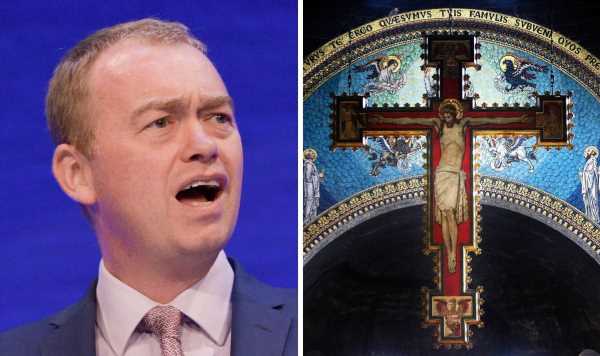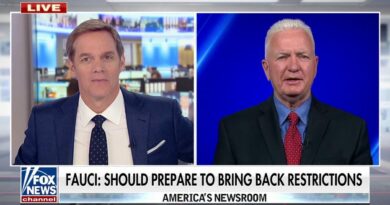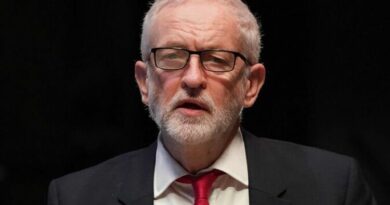The argument for – and against – religion in government
Brexit Party MEP slams Tim Farron's call for second referendum
We use your sign-up to provide content in ways you’ve consented to and to improve our understanding of you. This may include adverts from us and 3rd parties based on our understanding. You can unsubscribe at any time. More info
For more than 1,400 years, St Madoc of Ferns, an idyllic church set within the leafy Pembrokeshire village of Haroldston West, welcomed Christians through its doors to celebrate their faith. But after its congregation dwindled down to just two worshippers, it closed its doors for good this summer. This village church, a place once thriving with active Christians, represents the national shift in faith, particularly Christianity, where many are no longer following the Bible’s rule. Yet, in the heart of the British Government, religion appears to still be firmly placed. Should this be the case? Former Liberal Democrat leader and devout Christian Tim Farron certainly thinks so.
Parliament has for centuries been enriched by religion, with many prime ministers, cabinet members and MPs – as well as the array of characters inside the House of Lords –active supporters of their desired church. This, however, doesn’t necessarily reflect the British make-up of religious followers, with data revealing the numbers of worshippers declining nationally, as rreflectedin the tiny Welsh church.
“Politics is just another form of religion to some people… politics is a religion. They might not call it a religion, but it’s their ideology that is their worldview,” Farron told Express.co.uk.As a practising Christian, like hundreds of thousands across Britain, the 52-year-old follows the guidance of the Bible as best he can. It has helped politicians like him as he attempted to help map out a future for his nation – indeed, he led the Liberal Democrats between 2015 and 2017, helping rebuild a party decimated after its spell playing second fiddle to David Cameron’s Conservatives from 2010.
Findings published earlier this year by Statistica found that church attendance in England had fallen by around 300,000 since 2009, taking the average weekly number of people worshipping down to approximately 854,000 in 2019. Further data, it found, showed that just over a third of people in the UK identified as a Christian, significantly down from the two-thirds in 1983. So is there a reason for religion to remain notably at the heart of government despite its seemingly diminishing influence?


“People often say, ‘Alright you can have your faith, but don’t bring it into Parliament with you, or decision-making with you’,” Farron said. “And the answer to that is that is a lot less attractive as it first sounds as an idea, and makes a lot less sense as an idea. Christianity is a worldview, based upon our belief in Jesus being who he said he is. But it’s a worldview.
“So is Marxism, so Libertarianism, so is Anarchism. It seems peculiar, and all of those ‘isms’ are beliefs, they’re not absent of faith, they are faith in different things. So to say a Christian should leave their worldview, the tenants of their faith at their door, would we say the same to a Marxist or a Nationalist? Of course, we wouldn’t.”
Questions regarding religion’s influence over governmental policy were brought into sharp focus earlier this year when the Archbishop of Canterbury, Justin Welby, came under fire for wading into the row over then-Prime Minister Boris Johnson’s plan to send asylum seekers coming to the UK to Rwanda.
In his Easter Sunday sermon at Canterbury Cathedral, Welby claimed the Government were “sub-contracting out our responsibilities, even to a country that seeks to do well, like Rwanda, is the opposite of the nature of God who himself took responsibility for our failures”.
JUST IN: Elvis Presley raged over singers’ political views – ‘It’s not right’

It was seen as a huge intervention at the time, with the linkes of then-Foreign Secretary Priti Patel coming out to defend the proposals. But this wasn’t a new sensation for Welby, who has tiptoed on both sides of the line between religion and politics since taking over as Archbishop from Rowan Williams in 2013. He defended his dalliances into politics on his personal website three years ago, describing how important religion was to politics. He detailed how “five of my predecessors as Archbishop have died violently, three because they were involved in politics”. It was “risky” putting politics and the church together, he continued, but of significance.
He added: “You would have thought that we might have learned. Stay quiet, don’t collect taxes and keep your head down (and on). The trouble is that’s not what Jesus Christ did. He was never party-political. No wing of politics – left or right – can claim God as being on its side.”
It is a viewpoint shared by Farron, who releases his own book discussing the relationship between religion and politics titled A Mucky Business: Why Christians Should Get Involved In Politics in November.
The MP for the Cumbrian constituency of Westmorland and Lonsdale, first elected in 2005, has been an ardent voice in support of the church during his time in Westminster. His beliefs were tested throughout his spell as leader of the Lib Dems between 2015 and 2017, particularly in his final year when quizzed about his relationship with religion during the general election campaign.
DON’T MISS:
Hindu and Muslim riots should not be happening here, says JAMES WHALE [COMMENT]
Queen’s deft touch in historic meetings with Pope revisited [INSIGHT]
Extremist groups ‘going up to people and asking their religion’ [ANALYSIS]

And while church numbers seemingly drop, Farron actually wants more Christians to get involved in politics, and not be scared of what they might face. His beliefs, however, are not universally shared, even in his own party. Another former leader, Sir Vince Cable, discussed religion in the UK while he led his party at the 2019 general election. During the snap election campaign, Sir Vince addressed the question of religion in politics, claiming in a CNBC interview that the UK was “not a mainstream religious country”.
He said: “This isn’t America, it’s not Poland, we’re a fairly secular country so it’s not the vast majority of people wanting to express a religious view. But I think it’s one manifestation of the politics of identity that is becoming increasingly common. Identity is sometimes about religion, sometimes about colour, [and] sometimes about nationality.”
But Farron argued that religion in leadership is similar to having beliefs in other systems of governance. The politician detailed how people should be “honest and open about” where their worldview comes from, adding: “I think the idea that people can’t legislate on the basis of their faith is the same as saying you can’t legislate on the basis of your ideology. They are the same thing.”
Not everyone agrees with the likes of Farron and Welby. Critics include Yasmin Alibhai-Brown, an award-winning columnist for publications such as the i and co-founder of the charity British Muslims for Secular Democracy, which aims to “challenge perceptions, ideas and current thinking about British Muslims as a collective and the issues that affect the wider British society”.
Speaking to the New Internationalist in 2019, Ms Alibhai-Brown said “faith and state should always be separate”. Ms Alibhai-Brown examined how as a practising Shi’a Muslim, “my faith is in my heart and head” and that religion for her was “a solace; an antidote to the lies and noise of life outdoors… it makes me strive to be a better person”.

However “political Islam”, the author explained, “in contrast is aggressive, dominant, ruthless, and totally unethical”. She continued: “Think about authoritarian, powerful Catholicism. Secular states have their bad histories too and some, like China, are currently behaving monstrously towards individuals and minorities.
“But, it seems to me incontrovertible that the most sinister and oppressive states in the world are those that use God to control the minds and actions of their populations. Religion does have a place in public life. But when bishops, rabbis, priests and mullahs get political roles, they corrupt both good governance and religious integrity.”
However, for Farron, more Christians inside the corridors of power is something that is vitally important for the nation’s future. And more widely, he wants more from his faith to actually take note of the decisions that are being made there to help them understand how better they can prosper.
He added: “How should Christians view politics? They shouldn’t panic. But they should care. [The new book] looks at some of the reasons why Christians are sniffy, or scared, about politics. Or are sometimes wrong about politics.
“It doesn’t get Christians to approach it from a particularly partisan point of view. It’s not delivered like everyone should become Lib Dems and deliver focus leaflets. It’s not even saying you as Christians should join a party of any kind and stand for Parliament.
“In many ways it’s saying, that’s fine if you want to do it, but more broadly it’s about encouraging the much broader, the 99 percent of Christians who are never going to do that, to show them they should at least care about politics, and be knowledgeable about it.”
Source: Read Full Article



